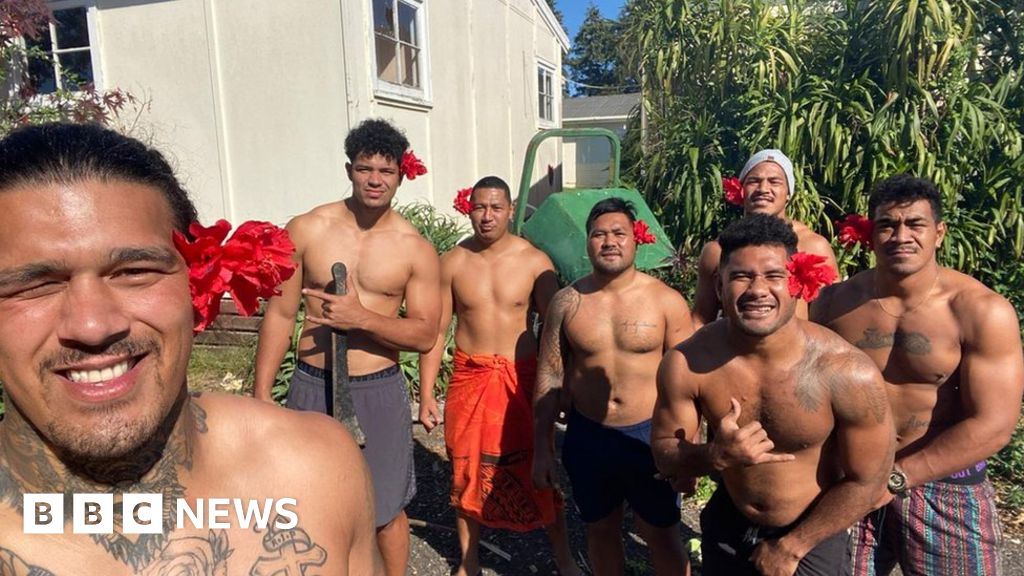
A professional rugby union team that set off for an away match on 23 February have still not made it home.
Manuma Samoa left their Pacific island for an away match in Perth, Australia, more than 100 days ago.
But on their way home they were forced to quarantine in New Zealand - and were then stuck when their home country closed its borders entirely.
In Auckland, the squad lived in a church compound for three months, with 20 players sharing one room.
Although they are now back in Samoa, they are halfway through a two-week quarantine - and players still haven't seen their families.
"When we arrived in New Zealand it was summer," the team's video analyst Hari Junior Narayan tells the BBC. "When we left it was winter."
Manuma Samoa's first game of the Global Rapid Rugby season was on 14 March, so the team left Samoa on 23 February.
They had a two-week training camp in Auckland, played the game in Perth, then planned to fly home via Auckland, in time to prepare for a home match in Apia on 21 March.
But while the team were playing in Perth, the Samoan government made an announcement.
From 08:00 on 15 March, the government said, anyone travelling to Samoa from one of 33 countries must spend two weeks in self-quarantine before setting off.
Australia was country 33 on the list.
The squad were allowed to enter New Zealand, and the Auckland compound where they held their pre-match training camp was still available. But that's where their good luck ended.
On 24 March, the Samoan government announced that, from 26 March, "all international travel to and from Samoa by plane is ceased". The team could not leave quarantine until 30 March.
They were stuck.
At the compound, 20 players stayed in single beds in one large room, while the management stayed in smaller rooms.
"We had no privacy or anything like that," says Theodore McFarland, who stands six feet six inches tall. "There were a few guys snoring."
But despite the snoring, he says, spirits stayed high. The squad played bingo most evenings - with stakes of 50 cents or $1 - cooked outside in Samoan "umus" (stone ovens), and kept fit.
They turned their living room into a gym, and, thanks to a quirk in the rules, were allowed to train outside - even after New Zealand went into Level 4 lockdown on 25 March.
"After lockdown, the police came to break up our game of touch [rugby]," says video analyst Narayan. "It wasn't a great look from the outside - but we were within our bubble."
New Zealand's Level 4 rules said exercise had to be "solitary - or with those you live with". The officers, standing outside the locked gates, let the housemates play on.
Despite living cheek by jowl, Narayan insists there were no arguments between the players.
"Probably the biggest disagreement was at bingo," he says, laughing. "Money was involved so no-one wanted to lose."
And - in what may be surprising news to British rugby players - the squad stayed off the beer, despite being locked down for so long.
"We're not allowed drinks, or any of that," says McFarland. "It's part of our rugby culture - especially as we were staying in a church compound."
After New Zealand's lockdown eased in late April, a handful of the squad who lived locally were allowed to leave, but the Samoan-based players remained stuck.
The bingo and the umus continued, yet the day-to-day monotony wasn't easy on the squad's mental health.
"We were in a compound, you see the same people every day," says team manager Tuala Pat Leota. "I imagine this is what a prisoner feels like."
To make this worse, glimmers of hope would arrive, only to be snuffed out.
"They [the authorities] kept pushing it back," says Leota. "At the start, they said maybe April [for a flight home], then they pushed it back to 19 May, then 22 May, then to 29 May."
Finally, a week ago, the players were able to leave the Papatoetoe compound. But the waiting wasn't over - Samoa is one of the few countries without a virus case, and they are not taking chances.
So, after the players landed on home soil, they were put in quarantine for two weeks.
The players and management are staying in separate, isolated locations. Leota and Narayan are together in a hotel, for example, but McFarland is on his own.
Suddenly, the compound in Auckland doesn't seem so bad.
"We were like a family there," says McFarland. "I think that made it easier for us, but now I've got no-one! Now I wake up and…it feels crazy, it's just me."
So he's missing the 50 cent bingo? "Definitely," he replies.
Leota also says there were positives to emerge from their epic journey home.
"To me," he says, "the friendship and companionship with the players and management is something very positive to come out of this not ideal situation."
Thankfully, a journey that began 104 days ago is almost over. In a week's time, the squad will taste freedom, and see their families for the first time since February.
"My daughter is four months old," says Narayan. "The last time I saw her, she was one month, so I've missed a lot."
That game in Perth on 14 March - which the Samoans lost - must seem like a long time ago?
"Sometimes," he replies, "we forget we even played a game."















 Phone: (800) 737. 6040
Phone: (800) 737. 6040 Fax: (800) 825 5558
Fax: (800) 825 5558 Website:
Website:  Email:
Email: 






